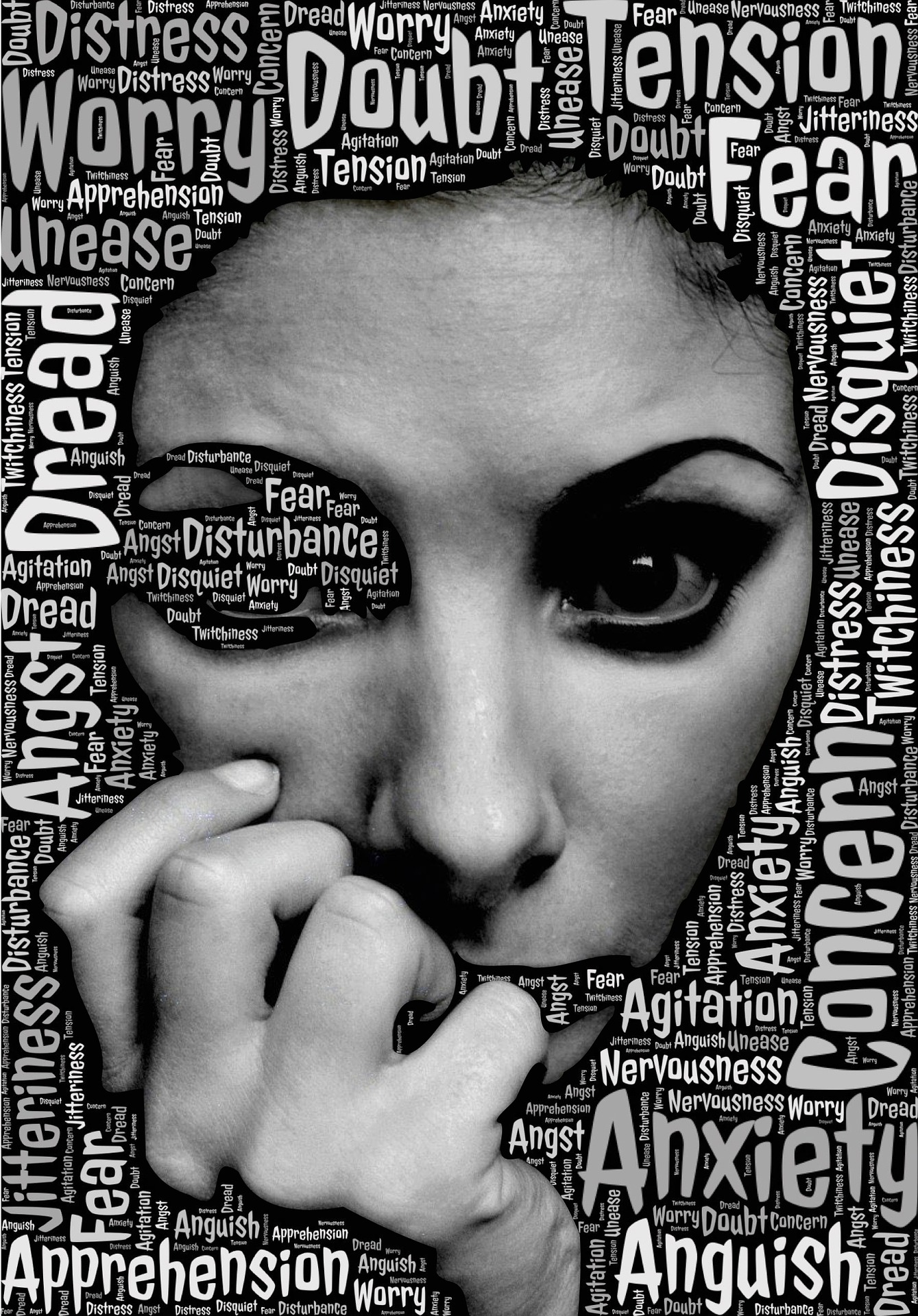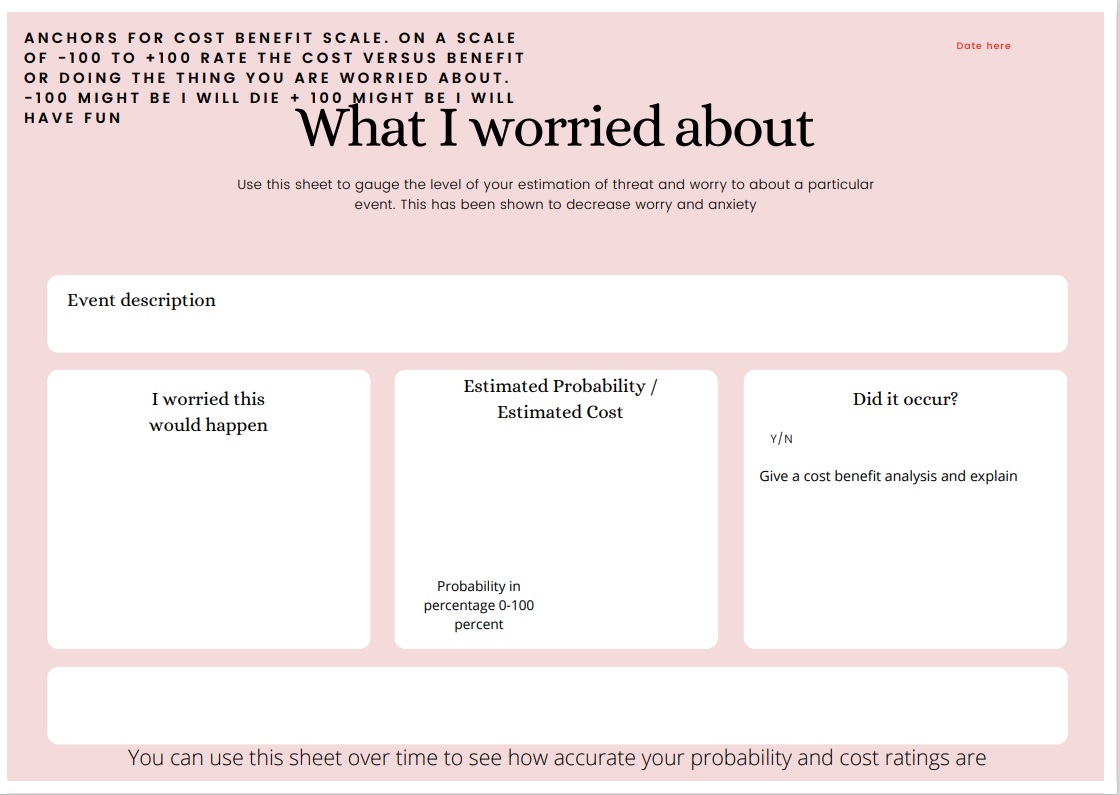THERAPY ISSUES FOR WORRYING
Your Mental health and Worry

Don't want to read the whole page?
What's here:
- Definition of worry
- Tips and Tricks
- A log to help you with decrease your threat perception and track your worries
- Some help understanding why you might worry
- Understanding why worry is not good for your mental health
STOP!! ADHD? Autistic? This page isn't for you.
The definition I like of worry is
"A chain of thoughts and images negatively affect-laden and relatively uncomfortable; It represents an attempt to engage in mental problem solving on an issue whose future outcome is uncertain but contains the possibility of one or
more negative outcomes." (1)
What the heck does that mean? When worrying, you have thoughts and pictures that don't feel good, but you feel like you are trying to solve a problem and stop something terrible from happening, so you keep doing it.
Is worry the same as anxiety?
No. Worry is what happens when your mind dwells on unpleasant thoughts, uncertainty, and all the things that could go awry. Worry is mostly about thinking and visualizing; anxiety also includes a physical component.
Worry is an attempt we make with our internal language to somehow avoid something bad from happening in the future.
Is worrying good for your mental health?
Not usually. In many cases worrying leads to stress and anxiety. When this happens, worrying has usually led to problems in your body such as:
- muscle tension
- feeling "keyed up
- problems concentrating
- inability to sleep
- heart beating fast
- feeling grumpy, exhausted or depleted
Worry and Mental Health Disorders.
Worry is most closely related to generalized anxiety disorder, and in fact, it's the key symptom of generalized anxiety disorder. However, worry also plays a crucial role in many other mental health disorders. It has a role in most anxiety disorders, as well as depressive disorders.
Is Worrying Bad?
Most worrying is taken to the extreme and is bad. With our worrying, we are trying to solve problems and prevent negative things from happening. Our minds are
preparing to act adaptively, but it often goes awry.
Worry and Problem-Solving.
Research shows that worrying inhibits your ability to solve problems well because the rehearsal of terrible threat scenarios causes you to make errors in HOW you solve problems. ( Book). Worriers both overestimate the probability of threat and the cost of what is likely to happen.
Worry and Threat Perception Log

Worried about how your mental health is being impacted by your worries? You can help yourself by doing experiments that challenge your perception of threat! Check out this chart here and download it to track your worry:

Mental Health and Worry: Help and Tips
Give yourself a worry budget or schedule.
This strategy is often called containment. Allow yourself a certain amount of time during which you worry. When that time is up, no more worrying. During the day, if the thoughts pop up, write them down for only your worry time.
or
Expose yourself to your worries.
Set aside a time every day for 30 minutes to write out your fears, don't allow yourself to reassure yourself, and force yourself to worry for the entire time!
When you notice that you're worried about something, ask yourself if you are avoiding doing something important. SOMETIMES worrying is something we do when we don't want to do what we should. Problem solve if you can, and break this sneaky form of avoidance.
Write your worries down.
Research has shown that writing can sometimes decrease worry thoughts. Challenge the accuracy of your worries when you write them down. Look for extreme words and exaggeration such as everyone or nothing when you are analyzing your writing.
Visualize
that the board at a train station depicts your worries instead of trains. They come and go, but you don't have to board any of them. You don't have to get on any of them. Stay grounded.
Repeat repeat, repeat.
Titchener's repetition.
Repeat your worry over and over again slowly until it becomes meaningless. For example, "No one will like me, no one will like me, no one will like me ." This is a cognitive defusion technique.
Work on your fear of uncertainty.
Whenever you notice yourself avoiding the discomfort, dive into it headfirst. Meditation is a great place to start.
Mindfulness meditation teaches the practice of staying still amid uncomfortable thoughts and sensations, so it's one of the best ways to build up that skill.
Mental Health and Worry: Traits of People Who Worry
People who worry appear to have elevated threat perception.
In our modern society, the threat is less usually the threat of a predator. We perceive different kinds of threats to our loved ones, our sense of stability, and our understanding of self or who we think we should be.
We know from research that worriers and people with anxiety assess things inaccurately. When they think about the possibility of something terrible happening, they overestimate the likelihood it will occur( probability). They also believe it will be a lot worse than it actually will be if it happens ( cost). Research shows that worry anxiety, and threat are related. For example, when people who have social anxiety improve in therapy, their perception of threat goes down.
Other things we know about people who worry
Intolerance of uncertainty
People who worry a lot have a hard time with uncertainty. If they think about a situation and don't know the outcome, it can cause them to worry and obsess OR become paralyzed. Intolerance of Uncertainty can distinguish participants with generalized anxiety disorder (GAD) from healthy controls.
Are you interested to know more about this? Take the need for cognitive closure test and learn if you may have issues with cognitive closure that are adding to worry and causing you issues with your mental health.
High-performance standards.
The higher people's standards are ( the closer to perfectionism), the greater they imagine the cost of something going wrong. People who worry a lot often have high performance standards. If you struggle with high-performance standards, it might be a good idea to ease up on your perfectionism so you can improve your mental health and decrease your worry.
The self-discrepancy theory states that individuals compare their "actual" self to who they think they should be or their "ideal/ought self."
Inconsistencies between who they are or the "actual," who they think they should be, or the "ideal" are associated with distress(e.g., fear, threat, restlessness)
. Self-discrepancy is the gap between two of these self-representations that leads to negative emotions.
Goal investments.
Research suggests worriers may be highly invested in goals. For example, children who are convinced they must get straight A's are usually chronic worriers. If you notice that goals are an issue that you are hyperfocused on focusing on values is always a good shift to make here.
Negative beliefs
People who worry tend to have more negative beliefs about themselves, less sense of the world being safe and good, and less confidence and trust in other people being safe and good.
Mental Health and Worry References
- Borkovec, T. D., Robinson, E., Pruzinsky, T., & DePree, J. A. (1983). Preliminary exploration of worry: Some characteristics and processes. Behavior Research and Therapy, 21(1), 9-16.
- Davidson, J. (2014, Jan). What, me worry? Psychology Today, 47, 16. Retrieved from
http://nclive.org/cgi-bin/nclsm?url=http://search.proquest.com/magazines/what-me-worry/docview/1470789258/se-2?accountid=13217
- Gerlach, A., & Gloster, A. T. (2021). Generalized anxiety disorder and worrying a comprehensive handbook for clinicians and researchers. Hoboken, NJ: Wiley Blackwell.
- Grupe, D. W., & Nitschke, J. B. (2013). Uncertainty and anticipation in anxiety: an integrated neurobiological and psychological perspective. Nature reviews. Neuroscience, 14(7), 488–501.
https://doi.org/10.1038/nrn3524 - Leahy, R. (2005, Nov). THE WAY OF THE WORRIER. Psychology Today, 38, 68-72. Retrieved from
http://nclive.org/cgi-bin/nclsm?url=http://search.proquest.com/magazines/way-worrier/docview/214480787/se-2?accountid=13217
- Pattee, E. (2020, February 26). The difference between worry, stress, and anxiety. Retrieved March 26, 2021, from
https://www.nytimes.com/2020/02/26/smarter-living/the-difference-between-worry-stress-and-anxiety
Medical information obtained from this website is not intended as a substitute for professional care. If you have or suspect you have a problem, you should consult a healthcare provider.
Kristen McClure: Neurodivergent-Affirming ADHD Therapist and Coach with 30 years experience in North Carolina and South Carolina Offering virtual therapy and coaching services across North Carolina, including Ashville, Raleigh, Durham, Wilmington, Greenville, and more. Also serving major South Carolina cities such as Charleston, Columbia, Greenville, Spartanburg, Rock Hill, and more.

